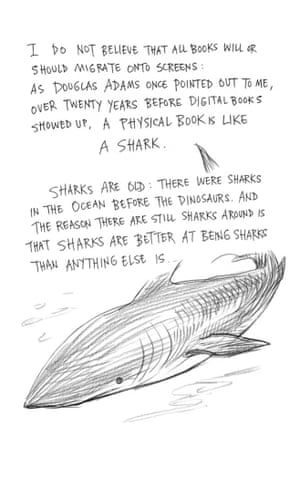
Neil Gaiman and Chris Riddell, 2018.
Cooperative Programming:
I am always somewhat bias towards books, as the beautiful On Why We Need Libraries: A Essay in Pictures (2018) touches on above. If TL’s have space for computers, there should be a computer station where a student can do research with the guidance of an educator. However, more likely, the reference services at an elementary school will exist for teachers. It is teachers who are going to come in and look for certain books to augment their monthly themes. It is teachers who will wander in, somedays on the morning of, needing to find where the “arctic owl section” is. So, librarians would do well to prepare themselves in advance to be in a position to anticipate the needs of the teachers that will be coming through the door.
It stands to reason that a school library, over years of use, will have evolved to house the books that teachers come to rely upon being there. This creates an expectation, a precedence and a pattern that librarians can begin to predict as the years go by. In this way, I strongly believe it takes a new librarian 3-5 years to truly get a handle on what their collection has to offer as well as what the expectations of the teachers are.
Collaborating:
Reidling (2013) describes the need for the reference interview between a librarian and their students. While I agree that this is a responsibility and privilege to investigate the literary appetites and research requirements of students, the more important, and often overlooked, interview lies between the librarian and their teacher colleagues. As Reidling eloquently says:
“In the reference interview, the school library media specialist’s goals are to determine efficiently and productively, the nature, quantity, and level of information the student requires, as well as the most appropriate format. The effective reference interview takes practice and creativity; this process can efficiently connect knowledge with the student’s information needs. It is crucial that the school librarians learn to listen and communicate more effectively with students” (Reidling, 2013, p. 99).
No librarian in their right mind would argue with this statement in wanting to help a student to find their way, but what if we replace “student” with “teacher”? It is very difficult for teachers to carve more time out of their schedules; this, we know. However, if a faculty member is going to utilize their school library, thus immobilizing the librarian as a resource in and of themselves, presumably, this act should take some weight off of the teacher’s shoulders. More appropriately put, “as in most professional activities carried out by the school librarian, effective collaboration development is done collaboratively” (Reidling, 2013, p. 17). Even more succinctly put: we need to work together. All too often teachers are floating on their own personal islands while the sand recedes around them. I they only had more time they could access the resources around them to make them feel less alone. Dramatic perhaps, but true nonetheless.
One of the key components of professional collaboration must be a positive and mutual respect between the teachers and the TL. At my school, because there are two teachers per classroom as per the Montessori education model, adding a third party can sometimes feel cumbersome or uninvited.
Other blocks to this elusive collaboration are outlined at length in Strategies for Successful School Librarian and Teacher Collaboration by Kammer, Donahaye and Koeberl (2021). “Another barrier to collaboration is the comfort level that either teachers or librarians have with their content areas. If a librarian comes from a humanities background then they may not be as comfortable collaborating on a science project for example (Kammer, p. 6, 2021). These excuses are irrelevant when approaching this important professional collaboration.
Teachers need to be as open to receiving support as librarians need to be open about offering it. “School librarians and teachers are engaged in efforts to collaborate at various levels to increase student achievement and be more effective teachers. Some of these efforts include co-teaching and supplementing an existing content-area lesson with library instruction” (Kammer, et. al., p. 2, 2021). Communication is the key to successful collaboration, and yet it can still be very difficult for some to approach and achieve.
Evaluating:
If our intention is to inspire creative collaboration and planning with our colleagues, then we need to ensure that we are able to offer them quality reference sources. In order to do that, we need money, plain and simple, and a vetted criteria that helps us to make decisions. “Selection policies are vital because they explain the process followed and the priorities established before any resource is purchased and placed in the school library collection” (Reidling, 2013, p. 18). If these policies are not observed, then the decisions become subjective and both time and money can be wasted.
Thankfully, we have some standards to guide us in these endeavours as, “the Ministry of Education and ERAC organize evaluation criteria under five main headings: curriculum fit, content, instructional design and social considerations” (BCTLA.CA p. 75). ERAC lays out these guidelines for us in order to maintain a certain standard and to help librarians make these important decision so that we are better equipped and able to support teachers and students.
Works Cited
BC teacher-librarians’ association. (n.d.). Retrieved February 26, 2023, from https://bctla.ca/wp-content/uploads/2018/02/erac_wb.pdf
Gaiman, N., & Riddell, C. (2018, September 6). Neil Gaiman and Chris Riddell on why we need libraries – an essay in pictures. The Guardian. Retrieved November 5, 2022, from https://www.theguardian.com/books/gallery/2018/sep/06/neil-gaiman-and-chris-riddell-on-why-we-need-libraries-an-essay-in-pictures
Kammer, J., King, M., Donahay, A., & Koeberl, H. (2021). Strategies for Successful School Librarian and Teacher Collaboration. School Library Research, 24, 1–24. Retrieved February 24, 2023, from https://files.eric.ed.gov/fulltext/EJ1292862.pdf.